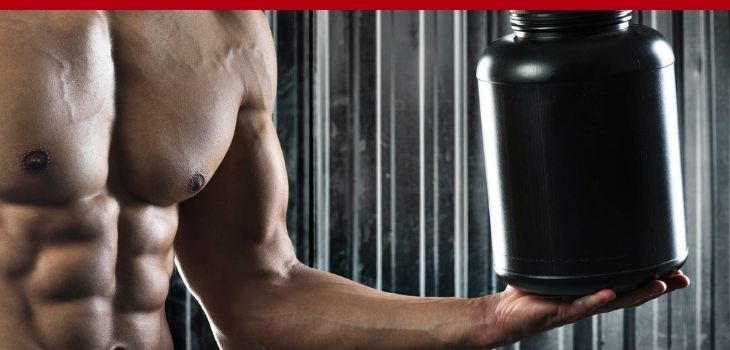Deciding which supplements to take is a common dilemma that many people face when starting strength training. Creatine is one of those supplements and you might be looking to learn more about it, whether it’s safe to take Creatine, and its impact on your results.
This is the question that Ted Ryce will answer today in this special Listener’s Question Episode.
Listener’s Question: “I Just Started Lifting Weights, Should I Take Creatine?”
Tune in for this new Ted Talk episode to learn everything you need to know about Creatine before you decide to take it. Ted uses his wealth of experience to reveal up-to-date facts about Creatine, whether it’s safe to take it, its effects on strength training and fat loss, and key factors that influence your weight and health to help you strengthen your body and lose fat in no time. Listen Now!
You’ll learn:
- What you should know before deciding to take creatine?
- Is it safe to take creatine?
- Is creatine good for strength training?
- What are the most important factors that influence your weight and overall health?
- Creatine and fat loss: Is it really important to take creatine for fat loss?
- And much more…
Related Episodes:
SUPPLEMENT GUIDE SERIES || The Ultimate Supplement Guide For Muscle Growth & Exercise Performance
SUPPLEMENT GUIDE SERIES || The Ultimate Supplement Guide For Fat Loss
6 Best Supplements For Building Muscle, Sleep, Stress & Better Health
Do You Need Help Creating A Lean Energetic Body Without Losing Your Social Life Or Following Time-Consuming Workouts & Restrictive Diets?
We help successful entrepreneurs, executives, and other high-performers to burn fat, transform their bodies, and increase their energy while enjoying life.
If you’re ready, sign up for my new LIVE event, “Unstoppable After 40 Blueprint” where I teach you the super simple 4-step process our successful clients are using to getting lean on autopilot.
Click here to sign up for this LIVE workshop Now!
P.S. This is a LIVE workshop on April 13th at 2 pm Eastern time. We have 15 guest seats only. There will be no replay for this event.
Podcast Transcription: Ask Ted: I Just Started Lifting Weights, Should I Take Creatine?
Ted Ryce: Hey, welcome to another Ask Ted segment. I’m your host, Ted Ryce, coach to entrepreneurs, executives, and other high performers. And we’re going to answer a question from Caitlin. Caitlin asks, “I am starting a strength training resistance training regimen. Should I also start a creatine regiment with it? I don’t use any pre-workout or any workout supplements, but heard good things about creatine. Just let me know. Thanks.”
Okay, cool. So, when I get a question like this, now, I could just say, hey, creatine is a great supplement. And it’s proven to boost your workout performance, if you’re lifting weights, not if you’re doing long cardio. It’s proven to help with brain performance. It helps with depression. It helps with a number of different things. And so it’s a good supplement overall. And that’s true.
And of course, there are some risks for people who have kidney issues. But again, you’re an adult, you need to figure that out. Have you been to the doctor? Do you have a checkup? Do you have damaged kidneys? Do you have a doctor that you can ask, “Hey, I’m going to take this supplement, is it cool?” Actually, you’ve got to be careful even asking doctors because a lot of them are ignorant when it comes to supplements.
So, make sure you work with a doctor who lifts and understand sports supplements. Don’t ask a doctor who doesn’t. I’ve heard doctors say, by the way—I know this is tangent, but I think it’s important, because I’m trying to give you the full context of what comes up for me when I see a question like this. I’ve heard a doctor say, “I don’t believe in supplements.” It’s like, what do you mean? It’s not like the boogey man, it’s not the Christmas… It’s not Santa Claus. There’s a ton of research on this.
And just because you’re busy reading the Journal of American Medical Association, doesn’t mean the Journal of Sports Supplements, you know, there’s a ton of high-quality research on different supplements and supplements haven’t found to be very efficacious at all. But there’s a ton of literature out there. But still, you should check, in case you have some kidney damages. I know a lot of people who may be in the 60s, 70s.
I wouldn’t have put my dad who was in his mid-70s, he was 76 when he died, I wouldn’t have put him on creatine, because he did have a kidney issue. In fact, that was the thing at the end that did him in, it was kidney failure, among other things. So again, that’s something to consider.
Now, here’s what I think about when I personally think about taking a supplement. So, I think about what I just said, is it safe? What is the safety? Two, has it been studied?
Because by the way, supplement companies, a lot of people think Big Pharma is an issue and it is, but those same people will go and buy a bunch of supplements and supplement companies. They’re even less regulated than pharmaceutical companies. Pharmaceutical companies have a much higher standard. Now it doesn’t mean there’s not some great supplement companies out there— there are, but they’re not as…
And I don’t think this is necessarily a bad thing, because I don’t want to get into a talk about politics in terms of regulating supplements and everything, but they’ve gone back and forth. And they’ve kept it unregulated the way it is. I personally think that’s okay. A
t the same time, you’ve got to have trustworthy companies who you buy from because they found all sorts of things in different supplements.
I would never buy creatine, for example, from China. I would never buy creatine from any other place other than a reputable company. And that goes with any supplement, by the way.
So now that we have that out of the way, let me say this. So, when it comes to a supplement, I’m thinking, okay, so how safe is it? How much research is behind it, not just marketing, what a supplement company says, and what is the goal? What is my goal? And for Caitlin, I’m having to assume her goal, because she wasn’t super specific, but she said that she’s starting a strength training regimen. And we know that creatine is beneficial for strength training.
Again, not running long distances or even medium distances. But if you’re going to be lifting weights or doing sprints, anything under 60 seconds, creatine helps with that. So, it does help with that. So cool.
How much does it cost? It’s fairly cheap. So, it’s a great supplement in terms of that. But I also want to say this, not only do I think about a supplement but also think about okay, but in the hierarchy of importance, if I want to get stronger, and I don’t know what your goal is Caitlin, if it’s to lose fat, if it’s to boost strength, if it’s to do a little bit of everything, if it’s to build muscle—because those are different goals, by the way.
Lifting for strength is different than lifting for muscle mass, it’s different than…Now, there’s some carryover and crossover. But those are different things. The strongest I’ve ever gotten, where I was hitting the max weight I’ve ever lifted, I was working up to one rep maxes, but my lifting volume was low, so I actually lost muscle as I was getting stronger. I’m going to repeat that for you again: I lost muscle as I was getting stronger.
So, you’ve got to think, okay, well, where does it fit in with the goal of getting stronger? Where does taking creatine? Well, what’s even more important than taking creatine is your workout? What type of workout are you following? Is it a well written workout? Most workouts aren’t well written. There’s a bunch of good, I think, decent programs online. But there’s even more stupid, ridiculous programs online. So, make sure you have a good workout program from someone reputable.
The second thing I would say is, even more important than then creatine, is your nutrition. How many total calories are you eating? How much protein are you eating? Where are you getting those calories from? What’s the quality of the food that you’re eating? That matters. It’s not just about calories. Calories are number one for fat loss, but the quality of your food is going to help with recovery from exercise.
If you have more micronutrients, in other words, vitamins, minerals, and things like phytochemicals, antioxidants, those things are going to help with recovery. Also eating enough food and also having enough carbs to fuel performance. And after those two things, I would even say sleep is more important, and maybe even stress management.
And so the program that you’re doing, it’s probably the most important. That’s what I would say. Nutrition is second, sleep and stress are third and fourth. And then fifth would be, oh, should I take creatine or not. So that’s what I would tell you.
And doesn’t mean not to take creatine, but what I found—this is something I used to do—back in the day, I thought I knew all there was to know about working out. We’re talking like 15, 17 years ago, 20 years ago, maybe, even. And the more years, the dumber I was.
And of course, I’m just kind of using self-deprecating humor. I was pretty good for the time, but things have changed a lot. We have way better information now. And I would get to a point where I’d hit a plateau and I would be looking for the supplement that I needed to take me to the next level.
Now I don’t do that. Now I’m like, okay, is my workout optimized? How about my nutrition? Okay, let me look at my Oura Ring. How is my resting heart rate? How’s my sleep? How am I doing here? And then I worry about the supplements. It doesn’t mean you can’t take the creatine, but it’s just understanding the hierarchy of importance. And most of the time, what I mentioned is going to be more important than what supplement you’re taking almost all the time. I can’t even think of an example where the supplement is more important than the things that I’m talking about.
So, should you take creatine? If you have healthy kidneys, you’re clear by a doctor, absolutely. But should you place so much importance on it? It’s kind of interesting. And this is nothing against you Caitlin because I used to be this way, and many people are this way. But people don’t ask me like, “Hey, I just started lifting weights, what should my sleep be? How many calories should I be eating? What’s the right amount of protein? I’m a little curious, should I take protein supplements?” It’s like, should I take creatine?
Caitlin maybe has everything dialed in. And that’s amazing, if you do, but the reason I bring this up because someone might ask the same question, not have everything dialed in, but they’re hoping they can show up to the vitamin shop, spend 20 bucks on creatine and it’s going to create the breakthrough. And then they use it and then they say, “You know what, I don’t really feel the difference in creatine.” It’s like, yeah, because you sleep four and a half hours, you’re stressed. You eat like crap. You don’t eat enough protein and your workout sucks.
So, creatine, isn’t so powerful that it’s going to overcome all those issues. And that’s what I have to say about that. I know that was a bit comprehensive, but my aim in this is to help you work out the thought process that I have when I think about this for myself. Should I take this supplement? Sometimes I experiment with things, but should I spend money on this supplement?
And so that’s how I work it out. So let me ask you this. What was your big takeaway from today’s talk about creatine because we talked way more than just about creatine? What is your big takeaway? How can you take that takeaway and turn it into action?
Again, listening, listening, listening is not learning. Listening, applying, listening, applying, that’s how you learn.
So, what can you do to make this actionable and turn it into action and into something that’s going to help you? That is what I want to leave you with. Have an amazing weekend, and I’ll speak to you on Monday.
Sign up to receive email updates
Enter your name and email address below and I'll send you periodic updates about the podcast.









